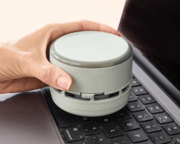Is your air conditioner costing you more than it should? Find out how to fix it.
By
Maan
- Replies 0
Maintaining your home’s appliances is key to keeping things running smoothly and efficiently.
Yet, there’s one task that many tend to overlook, despite its importance. It’s quick, easy, and can make a noticeable difference.
Here’s why it’s worth your attention.
Many parts of Australia endure sweltering heatwave conditions from time to time, meaning air conditioners may have been working overtime.
While it’s easy to forget, cleaning your air conditioner is a crucial step to ensure it runs effectively, lasts longer, and doesn’t unnecessarily spike your energy bills.
Beyond performance, a dirty air conditioner can pose health risks, as it may circulate dust, pollen, and even mould.
Gold Coast-based GP and Bond University assistant professor, Dr Kieran Le Plastrier, highlighted that air conditioners filter out large particles like dust and pollen, which can irritate airways.
Chris Barnes, a heating and cooling expert from CHOICE, explained that neglecting your air conditioner’s filters could lead to higher energy bills.
‘The general estimate is that a clogged filter can add something like 5-15 per cent to running costs,’ he said. He pointed out that the appliance may not only cost more to run but also fail to provide sufficient cooling.
For such a simple task, the benefits are clear. ‘For the sake of a five-minute job of dusting the filters, it’s worth doing,’ Barnes added.
Most local homes are equipped with split-system air conditioners. These models feature indoor units connected to outdoor compressors, with the filters typically located just behind the indoor unit’s plastic hood.
Barnes recommended checking the user manual for specific instructions on opening the unit and removing the filters. He said, ‘They’ll probably have a bit of dust on them—or maybe a lot—and you can just brush that off.’
To minimise spreading dust, he suggested cleaning filters outdoors. For extra dusty filters, gently vacuuming them with a dusting brush attachment or carefully washing them can help.
Always let the filters air dry completely before reinserting them.
Dust can also build up on ducts and vents. Dr Le Plastrier suggested using a vacuum or soft cloth to wipe away any accessible debris, emphasising safety precautions such as turning off the unit and using a stepladder when necessary.
The outdoor compressor needs attention too. Barnes advised clearing leaves, spider webs, and other debris around the unit to maintain proper airflow.
‘Give it a bit of a going over with a broom if it’s looking a bit mucky, and make sure there’s clear space around it,’ Barnes said.
Dr Le Plastrier recommended tying filter cleaning into your regular home maintenance routine, such as checking smoke alarm batteries. The frequency of cleaning depends on how often the air conditioner is used and the level of dust in the air.
Barnes added, ‘If you run your air conditioner heavily and you’ve got very dusty air, you’re probably going to need to think about cleaning it more often.’
If you notice mould in your air conditioner, it’s time to call in experts. Barnes explained, ‘Air-conditioner servicing companies and installers will usually offer a cleaning service.’
While routine cleaning can often be done at home, serious mould infestations require professional help, as they may extend throughout the indoor unit.
For those living in particularly humid climates, Barnes suggested occasionally running the unit on fan-only mode to help reduce dust and moisture build-up
This simple step can prevent the conditions that promote mould growth.
With these tips, you can ensure your air conditioner runs efficiently, saves you money, and keeps your home cool and comfortable all summer long.

Now that you know how simple it can be to clean your air conditioners, will you be adding it to your regular maintenance routine? Share your thoughts and any tips you have in the comments.
Yet, there’s one task that many tend to overlook, despite its importance. It’s quick, easy, and can make a noticeable difference.
Here’s why it’s worth your attention.
Many parts of Australia endure sweltering heatwave conditions from time to time, meaning air conditioners may have been working overtime.
While it’s easy to forget, cleaning your air conditioner is a crucial step to ensure it runs effectively, lasts longer, and doesn’t unnecessarily spike your energy bills.
Beyond performance, a dirty air conditioner can pose health risks, as it may circulate dust, pollen, and even mould.
Gold Coast-based GP and Bond University assistant professor, Dr Kieran Le Plastrier, highlighted that air conditioners filter out large particles like dust and pollen, which can irritate airways.
Chris Barnes, a heating and cooling expert from CHOICE, explained that neglecting your air conditioner’s filters could lead to higher energy bills.
‘The general estimate is that a clogged filter can add something like 5-15 per cent to running costs,’ he said. He pointed out that the appliance may not only cost more to run but also fail to provide sufficient cooling.
For such a simple task, the benefits are clear. ‘For the sake of a five-minute job of dusting the filters, it’s worth doing,’ Barnes added.
Most local homes are equipped with split-system air conditioners. These models feature indoor units connected to outdoor compressors, with the filters typically located just behind the indoor unit’s plastic hood.
Barnes recommended checking the user manual for specific instructions on opening the unit and removing the filters. He said, ‘They’ll probably have a bit of dust on them—or maybe a lot—and you can just brush that off.’
To minimise spreading dust, he suggested cleaning filters outdoors. For extra dusty filters, gently vacuuming them with a dusting brush attachment or carefully washing them can help.
Always let the filters air dry completely before reinserting them.
Dust can also build up on ducts and vents. Dr Le Plastrier suggested using a vacuum or soft cloth to wipe away any accessible debris, emphasising safety precautions such as turning off the unit and using a stepladder when necessary.
The outdoor compressor needs attention too. Barnes advised clearing leaves, spider webs, and other debris around the unit to maintain proper airflow.
‘Give it a bit of a going over with a broom if it’s looking a bit mucky, and make sure there’s clear space around it,’ Barnes said.
Dr Le Plastrier recommended tying filter cleaning into your regular home maintenance routine, such as checking smoke alarm batteries. The frequency of cleaning depends on how often the air conditioner is used and the level of dust in the air.
Barnes added, ‘If you run your air conditioner heavily and you’ve got very dusty air, you’re probably going to need to think about cleaning it more often.’
If you notice mould in your air conditioner, it’s time to call in experts. Barnes explained, ‘Air-conditioner servicing companies and installers will usually offer a cleaning service.’
While routine cleaning can often be done at home, serious mould infestations require professional help, as they may extend throughout the indoor unit.
For those living in particularly humid climates, Barnes suggested occasionally running the unit on fan-only mode to help reduce dust and moisture build-up
This simple step can prevent the conditions that promote mould growth.
With these tips, you can ensure your air conditioner runs efficiently, saves you money, and keeps your home cool and comfortable all summer long.
Key Takeaways
- Many parts of Australia experience intense heatwaves, causing air conditioners to work overtime.
- Cleaning air conditioner filters is essential for optimal performance, reducing energy costs, and preventing damage.
- Neglecting maintenance can lead to higher energy bills and potential health risks, such as mould growth.
- Regular cleaning of filters and units can improve cooling efficiency and help avoid costly professional servicing.
Now that you know how simple it can be to clean your air conditioners, will you be adding it to your regular maintenance routine? Share your thoughts and any tips you have in the comments.








